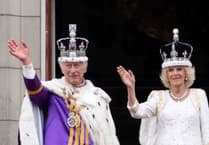The Isle of Man was the topic of a popular American documentary series last weekend, with an episode looking at the TT races.
CBS’s ‘60-minutes’ series, which began in 1968 and averages nine million viewers each week, offers investigative reports, newsmaker interviews, feature segments and in-depth profiles on a variety of topics all over the world.
Last weekend’s episode included a 22-minute feature on the Isle of Man TT races, which involved the general context of the island, interviews with a variety of local figures and close-up footage from the annual races.
The segment was hosted by broadcast journalist Bill Whitaker, who has been a correspondent for the ‘60-minutes’ series on CBS since 2014.
Whitaker began the short-length documentary with a general introduction and outline of the Isle of Man, showing where the island is on a map, explaining how King Charles is the ‘head of state’ (Lord of Mann), describing the anatomy of a Manx cat and labelling the island as a ‘tax haven’.
He said: ‘If you asked an American to point out where the Isle of Man is on a map, it might take them a while.
‘What drew us [CBS] to the Isle of Man was not the beauty or the banking, but the hair-raising annual event of the TT, which at first glance looks completely out of place on this tiny jewel of an island.’
Whitaker went on to explain the island’s culture and heritage with help from interviewee Catriona Mackie, a lecturer of Manx history at University College Isle of Man.
The pair discussed the Vikings establishing Tynwald, with the segment seeming to push the concept of Manx pride and patriotism through archive footage of Tynwald Day.
Whitaker also interviewed Ruth Keggin Gell from Culture Vannin, who discussed the significance of the Manx language and the importance of not letting it die. This was accomodated with footage from Bunscoill Ghaelgagh, the only Manx-language speaking primary school on the island.
This was followed by an interview with Matthew Richardson from the Manx Museum, before the segment delved into the TT races with appearances from Richard ‘Milky’ Quayle (the Manx TT winner in 2002), Paul Phillips (TT organiser for the last 15 years) and Peter Hickman (current rider who won four races at last year’s TT).
With the programme being so popular in the USA, the documentary was likely to have informed many Americans who previously would’ve known very little about the island.
Commenting on Facebook, Margie Houghtailing from Minnesota said: ‘I recently travelled to Ireland but I knew nothing about this. This was a fantastic story and a great show - thank you!’
Jefferson Clark from Oklahoma said: ‘This is so cool. If you ever want to feel alive just hop on a crotch-rocket for a time - you’ll feel alive all the way down to the tips of your toes. There’s nothing more exhilarating than this, not even being hunted by the enemy or your first taste of true love.’
Maurice Turgeau from Alabama said: ‘Well done 60 minutes. As an American that runs tours to the TT and also a supporter of our American racers, the piece was surprisingly unbiased and very informative.
‘I wish more coverage of the event was as positive as this. Thanks again for a job well done!’
However, it wasn’t all positive with regards to people’s opinions of the segment. American Rick Kay wrote: ‘Being a racer from the US that has raced twice on the Isle of Man, 60 Minutes did not do a good job on this story.
‘Though the history lesson was nice, once it got to racing, they only talked about the two weeks for TT and failed to mention the Manx Grand Prix (MGP), which is the exact same course and even some of the same professional riders. They did push the danger aspect by quoting fatality numbers - but a large portion of those numbers are from the MGP. It’s disgraceful to use those numbers to push your agenda of the danger.’




